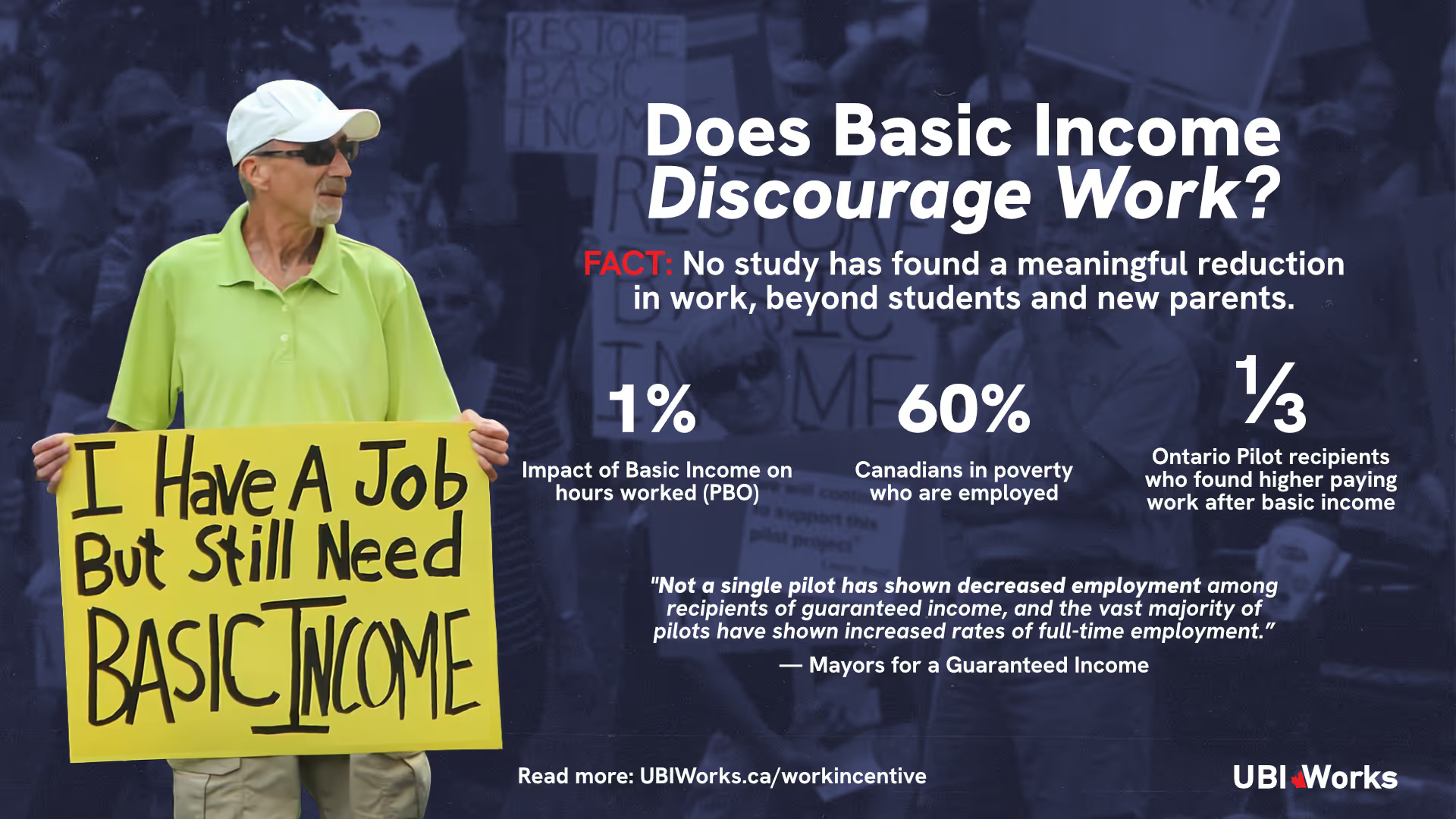One of the most common misconceptions about guaranteed basic income programs is that they disincentivize work. Yet, study after study shows the opposite.
People who receive a basic income generally do not work less, with the exception of students and new parents. In fact, the research suggests that the increased income enables people to invest in tools and take risks leading to gainful work, boosting overall employment potential.
Evidence from Canada
- The Parliamentary Budget Officer estimated that a national guaranteed basic income would impact hours worked about ~1%, or “basically a few hours per year”.
- During the Manitoba Mincome Experiment in the 1970s, the majority of recipients continued working. The two group who worked less were new mothers and young men who stayed in school instead of dropping out to support their families. High school graduation increased. Median wages increased 6.8% compared to a baseline control, even for those who weren't receiving the basic income.
- During the Ontario Basic Income Pilot, 1/3 of recipients surveyed who were continuously employed found higher paying work. 1/3 said basic income helped them in their employment or building a business.
Evidence from around the World
- A meta-analysis of over 105,000 participants across 16 studies found no meaningful reduction in number of hours worked or labour participation among basic income recipients.
- Mayors for a Guaranteed Income showed 20 studies demonstrating basic income increased employment.
"Not a single pilot has shown decreased employment among recipients of guaranteed income, and the vast majority of pilots have shown increased rates of full-time employment - Sam Altman’s UBI pilot found no conclusive reduction in work, with the exception of single parents. On average, recipients took the equivalent of an extra 15mins break/day. Many recipients took risks leading to better jobs, higher education, and new businesses.
- Germany’s largest UBI pilot funded by 200K donors found that recipients remained employed at the same rate and worked the same number of hours vs. the control group. More people enrolled in university and changed jobs, seeking better work.
- The Denver Basic Income Pilot increased full-time work vs. control, while saving the city $600,000 in public spending.
- A pilot in Arlington, VA found that employment increased 16% and employment income increased 37%, whereas the control group saw no such gains.
- Alaska’s Permanent Fund Dividend increased part-time employment by 17%, with no change in overall employment or hours worked.
- A pilot in Hudson, NY pilot found that employment increased in two cohorts of recipients, 72% and 150% above baseline.
- A pilot in Stockton, CA found that full-time employment for recipients increased 12 percentage points 1 year later, vs. 5 percentage points for the control group.
- In a Finland basic income pilot, recipients worked on average 6 days more than those on unemployment benefits.
What about CERB?
CERB was a temporary program that initially included a crippling work disincentive no permanent basic income program would ever have: a punitive 100% clawback of the benefits when recipients went back to work.
Even the Conservatives proposed making it more like a guaranteed basic income by introducing a gradual clawback to encourage work — a $0.50 reduction per dollar of income earned, just like what was tested during the Ontario Basic Income Pilot. They called it the “Back To Work Bonus”. The Liberals would later incorporate this work-incentivizing design into CERB’s successor, the Canada Response Benefit.
The bottom line — the research is pretty settled that guaranteed income programs don’t meaningfully reduce work.

